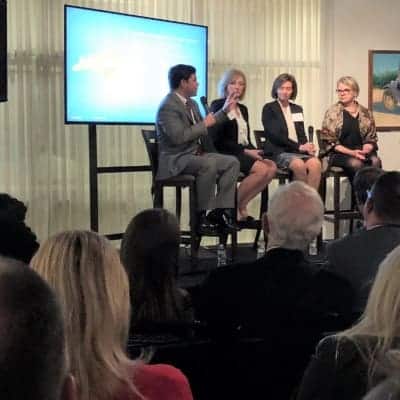
By my count, we have more than 10 state-level commissions working on education issues: myFutureNC, the Governor’s Commission on providing a sound basic education, and then more than a handful of others looking at how schools are funded, teacher preparation, the state lottery and school construction, the size of school districts, school safety, early education, workforce credentials, and how to better educate the whole child.
Do these commissions reflect your priorities? Or do they say something different about our challenges and our opportunities?
Jeremy Anderson, president of the Education Commission of the States, was in North Carolina, and he noted our multitude of commissions.
“The question that I have for you though,” Anderson said, “comes down to a little bit of governance. How many of those commissions or task forces are talking to each other? Where is the umbrella oversight to unify these kind of things and make it work?”
The governance question is who is in charge of our public schools.
In North Carolina, we have the Governor, the Governor’s Education Cabinet, the legislature, the Superintendent of Public Instruction, the Department of Public Instruction, the chair of the State Board of Education, the State Board of Education, 115 school boards for 115 districts, 115 superintendents, 173 charter schools, and 100 county commissions that supply our schools with local dollars.
“This is the era of local control,” said UNC System President Margaret Spellings to Anderson. “Washington is out of business.”
That is why from our classrooms to our courtrooms, the question of who is in charge is being debated and litigated.
Recently at the UNC School of Law’s Festival of Legal Learning, Justice Bob Orr suggested the road map for education policy in North Carolina looks a lot like the game Chutes and Ladders.
And then the following week, at the myFutureNC commission meeting, Jim Blaine, chief of staff to President Pro Tem of the Senate Phil Berger, handed out organizational and policy decision-making charts for the K-12 system, community colleges, and UNC. Guess what? They looked an awful lot like Chutes and Ladders.
Megan Alvord, a physics teacher in a North Carolina public school, saw the charts on social media and asked, “Who is running the show? The first thing that jumped out to me is the huge disconnect between the people voted for and the classrooms.”
A couple of summers ago, Alvord went to Singapore with a group of beginning teachers.
In Singapore, there are no natural resources in their small country. Instead they focus on the one thing they do have: human capital. Every five years, the government presents a master plan for education. Because the focus is on the people and their education, every five years, everyone buys in.
The changes that come with each master plan align the education of the students, the staffing of the schools, and the funding of the system, and it then takes just one year to fully implement the changes in every classroom in every school.
Alvord writes, “So how do we start creating a common vision here in North Carolina? Do we start small within departments within schools and work our way out? Do we wait for a vision from the top and hope buy-in comes via a trickledown effect? Can we start at both ends and meet in the middle?”
When it is not clear who is in charge, it is also not clear who is accountable. And when that is not clear, two things happen. Personality drives who has power, and those with power fill the vacuum.
Our many commissions are less about our priorities and more about different pockets of power trying to leverage the vacuums to move their agenda.
Anderson said in his work across the nation he has noticed that in states where “leaps and bounds” are being made, leaders have found ways to work across difference. “It’s a simple litmus test,” he said. “Can the people who can move this policy meet for coffee even if they disagree and talk through some of these differences?”
Anderson asked, “What are your goals, how are going to hold yourself accountable, and what is the governance to actually make that happen?”
Let’s start by having coffee.


